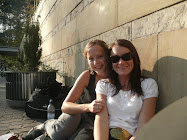



I had a dream of powder white sand beaches, vibrant aqua marine crystal waters set against perfect blue skies, palm trees in abundance, endless rays of sunshine, and a daily feast of freshly caught fish brought directly off fishermen on the beach...then I realised that in fact I hadn't been sleeping... we had been on holiday to Zanzibar!
Physically, emotionally, and mentally exhausted, Debbie and I pressed the 'stop' button and along with our friends Apolo and Ben, left Gulu for a holiday. Zanzibar is radiantly beautiful and can only be described as paradise on earth! Words and photos cannot do any justice to this picture-perfect Tanzanian island. A traditional palm-roofed house was where we lucky enough to call home for a week - 'White Sands' so aptly named for its idyllic beach front location with jaw-dropping views across the ocean. One morning sleeping out under the stars, I was lucky enough to awaken to the most amazing sunrise I have ever seen - I thought my eyes were deceiving me as the burning red sun rippled through the clouds with the colours glowing vibrantly as they reflected off the peaceful waters. A sensational way to wake up!
Uganda is a remarkably beautiful country and we have enjoyed many a weekend adventure visiting the Rwenzori Mountains, exploring game parks, trekking rhinos, white water rafting, camping on the banks of the river Nile, and swimming in waterfalls and crater lakes. This time we decided to head a bit further afield and experience a bit more of East Africa and stay in a place with very few physical demands. Whilst both Debbie and I are relishing the opportunity to work in a resource-limited developing country, owing to the nature of our work at the hospital, there is only so long that it is possible to work without a break. And Zanzibar certainly proved a perfect way to recharge the batteries.
We filled our days swimming in the sea, reading, relaxing on the beach, and playing frisbee (yes indeed we really are big kids at heart!) and cooking up a daily fish feast of the fisherman's catch of the day - snapper (red, white, and black), sting ray, barracuda, lobster, and blue fish as well as others that remain nameless but tasted delicious! Physical activity extended to include windsurfing and I'm proud to say I am now 20meters proficient even if I did spend more time crash landing into the sea than upright on the board! For me a highlight was swimming with wild dolphins off the south coast of the island- a truly magical and unforgettable experience!
Our week in Zanzibar was poles apart from our life in Uganda. We knew we were back in Gulu when we returned home to a weekend minus power, an inconsistent mains-water supply, an empty gas cylinder, and a red ant invasion. As we sat on the porch with a glass of (poor quality) red wine toasting our holiday, we were attacked by flying ants and moths nose dived and drowned in our wine ...a proper local-style Gulu experience, and we wouldn't have it any other way!










